Reframing the Anti-Aging Formulation Challenge
Formulating skincare products that effectively address signs of aging has long been a central pursuit in cosmetic science. Fine lines, sagging, and diminished elasticity are visible markers of a deeper biological shift—an inevitable decline in protein synthesis as our DNA ages. Formulators have traditionally relied on retinoids, peptides, and growth factors to trigger pathways that stimulate collagen production. But what happens when the skin’s intrinsic responsiveness to these ingredients declines with age?
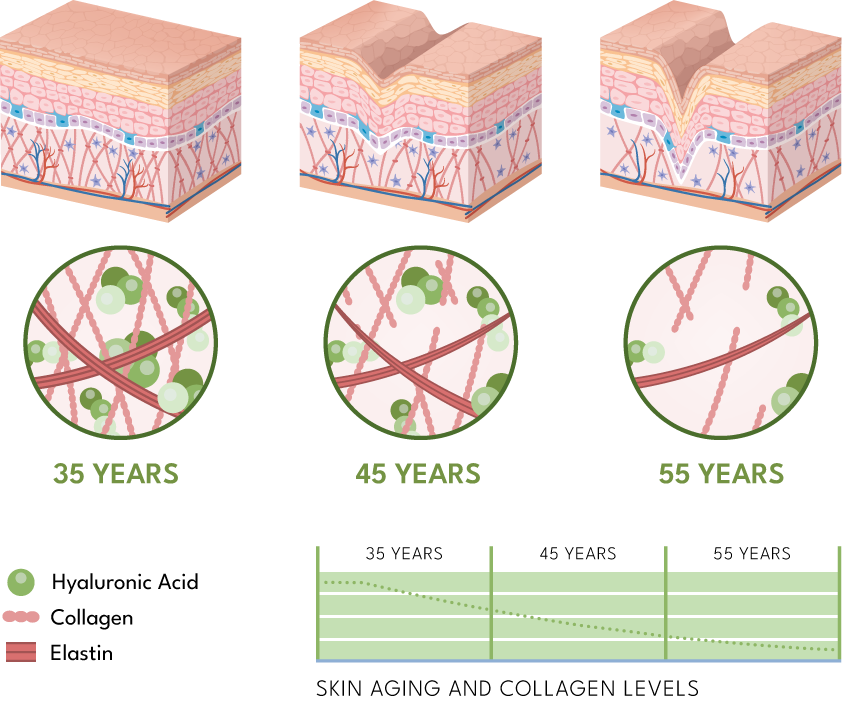
This is the tipping point where conventional approaches fall short. The physiological mechanisms they depend on—signal transduction, receptor sensitivity, enzymatic activation—grow increasingly inefficient in aging skin. As a result, even the most advanced formulations may deliver diminishing returns in older demographics. The demand for a more direct, more intelligent approach to collagen restoration has never been greater. This is where mRNA-Collagen, the first genetic skincare technology from Bio Genetic Technology (BGT), redefines the rules of engagement.
The Biological Bottleneck: Why Aged Skin Stops Responding to Retinoids and Peptides
Anti-aging actives like peptides and retinoids have been staples in cosmetic formulation for decades, celebrated for their ability to enhance collagen synthesis through biological stimulation. However, their performance is not universal—especially in mature skin, where the cellular environment is inherently compromised. Research indicates that with advancing age, the expression of messenger RNA (mRNA) declines, which directly reduces the body’s ability to synthesize structural proteins like collagen and elastin.
This biochemical reality limits the effectiveness of signal-based ingredients. Retinoids, for instance, promote collagen production through cellular retinoic acid receptors (RARs). But these receptors become less responsive as epidermal turnover slows. Peptides, similarly, rely on cell signaling cascades that may falter under oxidative stress or in postmenopausal skin. A 2020 review in Dermato-Endocrinology emphasized that the aging process not only affects dermal thickness and fibroblast function, but also undermines the very pathways that most anti-aging actives target .
Furthermore, traditional actives often come with a trade-off between efficacy and tolerability. Retinoid-associated irritation, peptide instability, and delivery limitations create additional hurdles for formulators. The trend toward minimalist, sensitive skin-friendly formulations only amplifies these constraints. For formulators seeking to create high-performance products that bypass aged or impaired pathways, the conventional toolkit is no longer enough.
Rewriting the Rules: How mRNA-Collagen Delivers Collagen at the Genetic Level
BGT’s mRNA-Collagen offers a fundamentally different strategy—one that doesn’t rely on stimulating existing pathways but instead introduces the genetic instructions directly into the cell to produce collagen. At its core, messenger RNA (mRNA) functions as a biological code, translating DNA instructions into proteins. In this case, BGT has engineered a synthetic mRNA that delivers the precise genetic sequence for collagen synthesis directly to fibroblasts.
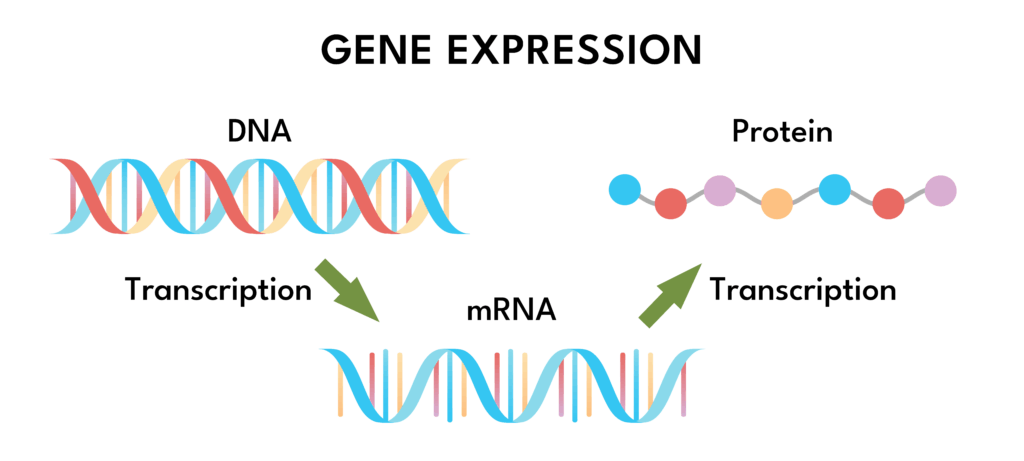
This direct method of protein expression circumvents the need for receptor activation or enzymatic conversion. Instead of nudging a sluggish biological system into action, BGT’s mRNA-Collagen essentially rewires it—providing cells with the blueprint and tools to build collagen themselves, regardless of age-related decline. This is the first time such genetic activity has been successfully harnessed in a cosmetic formulation, positioning it as a groundbreaking advancement for both anti-aging and regenerative skincare.
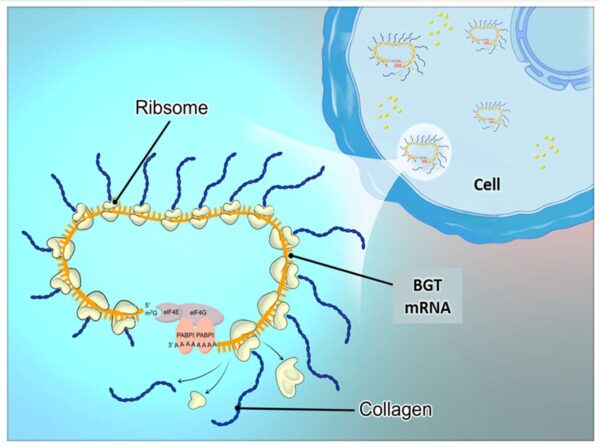
What sets BGT’s approach apart is its integration of artificial intelligence into the design process. BGT uses an AI-assisted system to optimize mRNA sequences for both structural fidelity and biological compatibility. This ensures not only effective translation into functional collagen proteins, but also stability within the formulation itself—an issue that has long plagued RNA-based applications in non-medical settings.
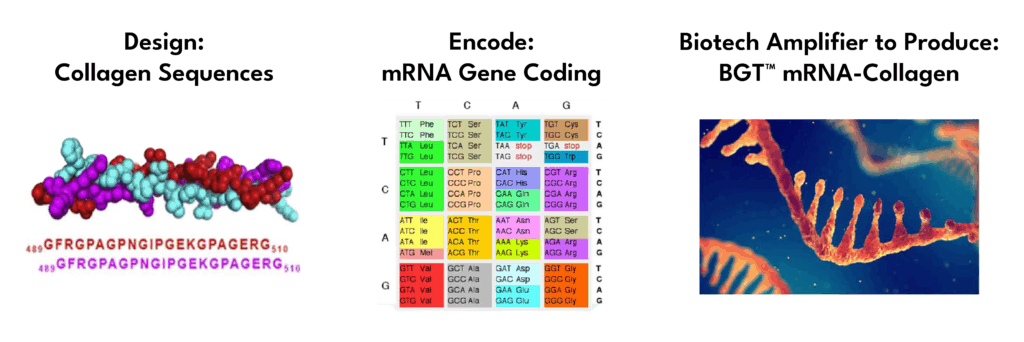
From Cell Culture to Clinical Use: The Science and Stability Behind mRNA-Collagen
BGT™ mRNA-Collagen is composed of Ribonucleic Acid delivered as a colorless, odorless solution containing 5 ppm RNA. It has been clinically tested in both in vitro and in vivo settings, showing remarkable efficacy and safety profiles. In human fibroblast cell lysate studies, BGT™ mRNA-Collagen was able to express collagen up to 6,000 times its own molecular weight—a compelling figure that underscores the exponential impact of genetic encoding.
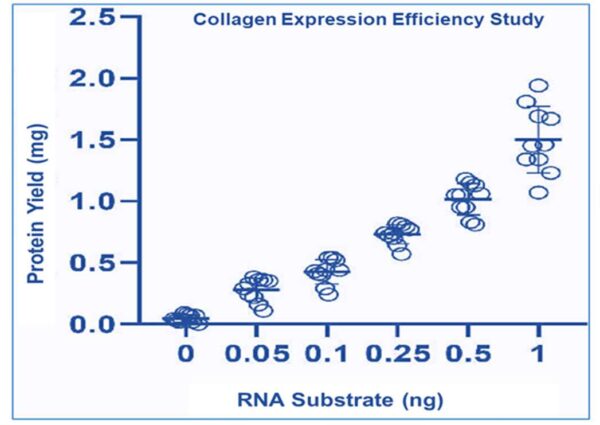
In a 30-day clinical trial using a microneedle-assisted application protocol, the results were equally significant. Participants showed a 49.39% reduction in the number of wrinkles, a 39.21% reduction in wrinkle depth, a 33.11% improvement in skin firmness, and a 23.53% increase in elasticity. Ultrasound imaging confirmed a 29.97% increase in subcutaneous collagen density and a 14.52% improvement in dermal thickness.
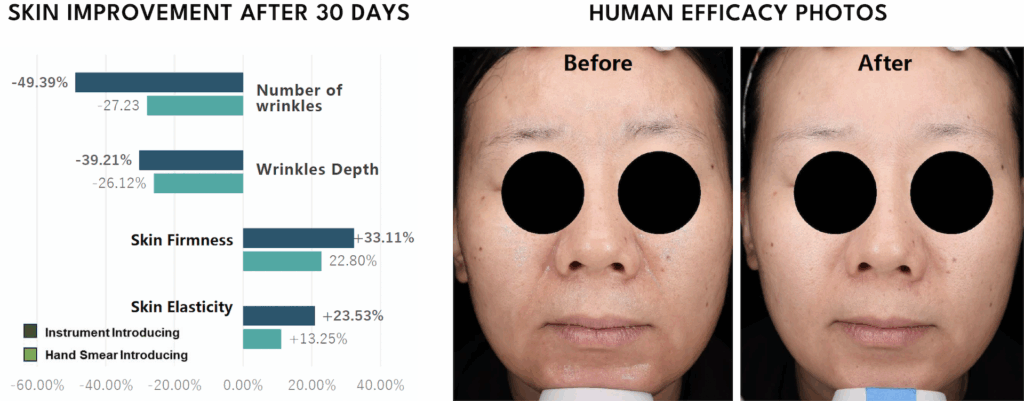
From a formulation perspective, BGT™ mRNA-Collagen is stable in aqueous solutions and compatible across a broad pH range. However, it should not be stored above 45°C and must be handled with care to prevent degradation from biological contaminants like nucleases. Recommended use levels range from 0.1% to 10%, depending on desired performance and application method. Importantly, the material is mild, non-irritating, and 100% biologically derived, making it suitable for sensitive skin and minimalist formulations.
Future-Proofing Skincare: What Genetic Actives Mean for Tomorrow’s Formulations
The introduction of mRNA-Collagen marks more than a technological breakthrough—it signals a philosophical shift in how we approach cosmetic science. Rather than compensating for the symptoms of aging skin, formulators can now intervene at the molecular root cause: declining protein synthesis. This technology aligns perfectly with emerging industry movements toward skin longevity, biotech innovation, and precision personalization.
According to Mintel’s 2024 Global Beauty and Personal Care Trends, consumer interest in “science-backed” and “biotech-driven” skincare has reached new heights, particularly among aging and wellness-conscious demographics . Genetic skincare fits squarely into this trend, offering a novel way to restore skin health not by mimicking biology, but by enabling it.
For formulators, the implications are profound. mRNA-Collagen can serve as a cornerstone active in age-delay, recovery, or dermal regeneration products—especially in treatments involving microneedling, post-procedure repair, or intense firming applications. It also opens the door for future mRNA-based actives beyond collagen, such as those targeting elastin, hyaluronic acid, or antioxidant enzymes. In short, the ability to design actives at the genetic level provides unprecedented creative and therapeutic control.
A New Era of Formulation Starts with Genetic Precision
BGT’s mRNA-Collagen doesn’t merely improve upon existing actives—it represents an entirely new class of cosmetic ingredient. By introducing functional genetic instructions into the skin, this technology achieves a level of precision and performance that traditional anti-aging ingredients cannot match. For formulators, this is more than an innovation—it’s a tool to create formulations that respect biology while actively rewriting its limitations.
As the skincare industry continues to intersect with biotech and gene science, staying ahead means embracing actives that deliver on both safety and sophistication. With proven performance, formulation compatibility, and a clear mechanistic advantage, BGT™ mRNA-Collagen is not just a new ingredient—it’s a new paradigm.
Ready to start formulating with BGT™ mRNA-Collagen?
Learn more and request your sample below or speak with your designated sales representative about formulation guidance.
Resources:
- Zouboulis, C.C., Adjaye, J. & Zöller, M. Skin Aging and the Decline of Cellular Pathways. Dermato-Endocrinology. 2020. https://www.ncbi.nlm.nih.gov/pmc/articles/PMC7401066/
- Mintel. Global Beauty and Personal Care Trends 2024. Mintel Reports. 2024. https://www.mintel.com
- Bio Genetic Technology LLC. BGT mRNA Technology May 2025 Presentation. Internal document.
- Bio Genetic Technology LLC. mRNA Handout 2025. Internal document.









